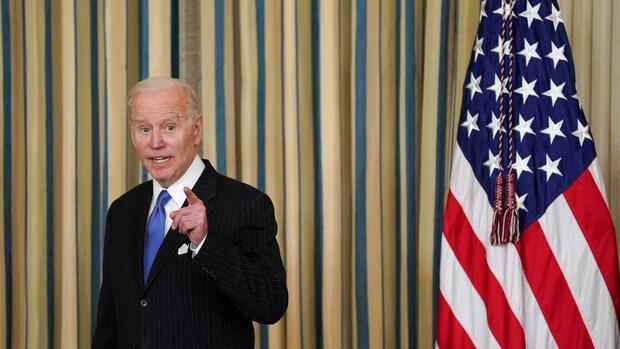Brakeman USA: The reorganization of the taxation of digital companies is viewed critically in Washington.
(Photo: Reuters)
Berlin For Olaf Scholz (SPD), it was one of the greatest successes as Federal Minister of Finance: At the international level, he was instrumental in pushing through the global minimum tax for corporations. He spoke of a “historic reform” last summer after 136 countries had agreed.
But if agreements on global tax reforms are tricky, the subsequent implementation is often even more difficult. Scholz’ successor Christian Lindner (FDP), who has to ensure that Scholz’ favorite project becomes a reality, is now feeling this. And that is no longer certain.
Because the implementation of the global minimum tax is increasingly faltering. It was already announced two weeks ago that the reform would not take effect in 2023, but only in 2024.
Now there is also growing concern that the US government will not be able to get part of the reform through Congress due to domestic political difficulties. This, in turn, saps the enthusiasm of some EU states that want to implement such a reform together with the Americans.
Top jobs of the day
Find the best jobs now and
be notified by email.
At the meeting of EU finance ministers in early April, Poland blocked the implementation of the global minimum tax. The unthinkable suddenly seems conceivable: that the reform will not come to pass in its entirety.
The reform is a two-part package. One is a global minimum corporate tax of 15 percent. The second element reforms the taxation of highly profitable large companies and is primarily aimed at digital groups such as Apple and Google.
USA take a critical view of digital taxation
This part is particularly difficult because at the same time tax revenues are being redistributed between states. And this second part could now become a problem.
Finance Minister Lindner is likely to meet his US colleague Janet Yellen at the IMF conference.
(Photo: Bloomberg)
While the US government under President Joe Biden quickly got used to the minimum tax – the US tax reform of a few years ago even served as a model for the global minimum tax – the reorganization of the taxation of digital corporations is viewed critically in Washington. Midterm elections are coming up in the United States in six months. EU diplomats fear that this reduces the chance that the global tax reform can still be passed in Congress.
When Finance Minister Lindner meets his US colleague Janet Yellen on the fringes of the IMF conference in Washington, global tax reform should therefore be an issue. So far, the Americans have been reassuring their European partners that the project will be pushed further. After all, it was Yellen who, with her clear support at the beginning of 2021, helped the reform to achieve an international breakthrough in the first place.
Yellen will work with her counterparts at the IMF meeting and the G20 meeting in Washington to advance global tax policy as part of a foreign policy for the middle class, the US Treasury Department said in advance.
Fear of failure of the reform in the US Congress
But Brussels and the European capitals are no longer quite so optimistic about the implementation of the tax reform by the US government. In its blockade, the Polish government pointed out that it was imperative that both components of the reform be dealt with in one large package.
For Poland, the redistribution of tax revenues is more important than the minimum tax. In this respect, it does not want to implement one part of the package without the other. At least that was the reason given to the European partners. “Several EU member states fear that the implementation of the OECD tax reform for the taxation of the digitized economy in the USA will fail,” says CDU finance politician Fritz Güntzler. That is why Poland is blocking the introduction of minimum taxation in the EU.
Read more about the global minimum tax here
Other politicians consider the Polish argument to be a sham. French Finance Minister Bruno Le Maire, who actually wanted to implement the minimum tax during the Council Presidency, spoke of a “mystery” as to why Poland had not agreed. An insider suspects that Warsaw may want to raise the price for approval.
In negotiation circles, meanwhile, a distinction is made between the negotiation and the implementation level. The global tax reform would continue to be negotiated as a package. That will not be shaken. But when it comes to implementation, it is possible that the second part of the reform, the global minimum tax, will come – while the first part, higher digital taxation, will fail.
Is there a comeback of national digital taxes?
Many states in Europe could live with that: Scholz, because his primary goal was always the global minimum tax anyway. Countries like France or Great Britain also, because they could reintroduce national digital taxes as previously planned. And they could now point out that, as agreed, an international agreement had been attempted, but had failed. Both countries are said to have already signaled such an approach if the worst comes to the worst.
However, the emerging markets are likely to be extremely upset. Because they were promised a larger share of the global tax cake with the first package of reforms. “The international community is facing a shambles in terms of tax policy,” says CDU finance politician Güntzler. For weeks, the federal government has only answered questions on the subject superficially or not at all.
Güntzler demands that the global tax reform must be taken back into the hands of those who once sold it as his success. “Despite all the existing crises, Chancellor Scholz must make global tax reform a top priority,” says Güntzler. “Otherwise, his promise of the brave new world of taxes remains just another unfulfilled announcement.”
More: Additional income of 150 billion dollars a year – that brings the global tax reform
